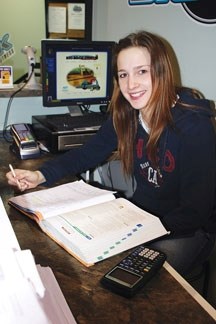Educators are voicing their concern high school students in the foothills may be forsaking their upcoming diploma exams while they try to maintain their commitments at part-time jobs.
It is a difficult balance for many students who can find themselves overwhelmed with excessive workloads in and out of school.
Elana Dawson, a Grade 12 student at Foothills Composite High School, plans to keep working at Big Rock Training and Fitness while preparing for exams in Math 30A, English 30 and Physics 30.
“I have been working more this year and my marks have dropped, but that might be because it is a harder curriculum, not because of work,” Dawson said.
Although she works sometimes as much as 30 hours a week, Dawson said she doesn’t want to stop working despite Grade 12 being the most important year of her school career.
“I need money to buy the things that I want like clothes and things like that,” Dawson said. “I also like to have my own money, my parents encourage me to be independent.”
Dawson said in regards to her studies, she is fortunate because she can squeeze in some hours of study while working at the Okotoks gym.
Foothills Composite principal Todd Schmekel informed Foothills School Division trustees during his annual report on Dec 15 he was concerned about the amount of hours some students work during the school year.
Schmekel said in an interview on Jan. 6, he is all for students having part-time jobs, as long as they can keep their priorities in order.
He said statistics from the United States and the Ontario area show students’ schoolwork begins to suffer once they work more than 20 hours a week.
“Some of the kids I have talked to are working more than 20 hours a week,” Schmekel said. “I don’t tell the students they shouldn’t work, but I tell them school is their primary job. When school becomes your part-time job, then the ducks are out of row.”
Schmekel said the Okotoks area is fortunate to have caring employers who are concerned about the students’ education. As well, many of the employers are members of the school’s work-experience programs.
“Working helps the students learn discipline, gives them some financial understanding and it also gives them a sense of independence,” he said.
However, students have to take control of the situation. He said if grades start to slip, the students should be discussing the matter with the employer and, most importantly, their parents.
Schmekel said only a small percentage of students are working in order to help out the family financially.
He said if a student’s grades suffer due to work, it could limit their possibility for post-secondary education, which ultimately could result in lower waged jobs when they enter the workforce as adults.
Marlene Donnelly, a guidance counsellor at Holy Trinity Academy, knows first-hand it is possible to balance school and work part-time.
She worked at Canadian Tire while attending high school in Forest Lawn and the University of Calgary in the 1980s. Donnelly was also a member of the U of C track and field team.
She said there are more work demands on both work employers and employees due to longer hours than when she went to school. Donnelly said she knows of at least one incident where a student is closing up the business at 11 p.m. on a school night.
“Back then, a lot of the stores were open late maybe Thursdays and Fridays and they weren’t as many open on Sundays,” Donnelly said of her days working after school.
However, she stressed the majority of local businesses, such as Shoppers Drug Mart and Okotoks Sobeys, are excellent employers for students and put a priority on academics.
She said if students want to work, they must give their employers notice concerning exams and assignments.
“The students have to take ownership of their work and their exams,” Donnelly said.
She said the majority of employers are co-operative, however, there was an extreme case some years ago, when she stepped in and called an employer to confirm a student’s exam schedule.
Donnelly always reminds students to keep their priorities in regards to work and school.
“I always tell them that they have their whole life to work,” she said. “Now is the time to focus on school.”
Magda Carlson, a Grade 11 Foothills Composite student, said she consults closely with her manager at the Okotoks Booster Juice franchise in regards to her schooling — including extracurricular activities.
“He allows us to have time off for school,” Carlson said. “I don’t work Mondays or Wednesdays because of cheer (cheerleading)… They really understand if someone isn’t able to work.”
One of Schmekel’s main concerns about students working too much is it prevents “kids from being kids.”
He said students taking advantage of extracurricular activities such as drama and sports are an important part of the school community.
He knows first hand what he is talking about. Schmekel wanted to work at a burger joint while growing up in small-town Saskatchewan. His father encouraged him to play high school football instead.
They came to an agreement where Schmekel agreed to work limited hours, but Schmekel started thinking of the green — not Rider green, but greenbacks — and snuck in a few more hours.
“My dad made me quit and I played football,” Schmekel said with a laugh. “It was the best thing he could have done for me.”


.png;w=120;h=80;mode=crop)

